- Back to Home »
- Spectacular infrastructure projects
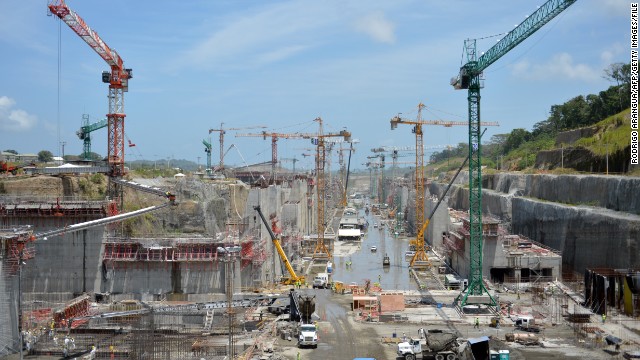 The Panama canal is being upgraded at a cost of $5.25 billion to ensure it is capable of handling the ever-increasing size of the world's biggest cargo ships.
The Panama canal is being upgraded at a cost of $5.25 billion to ensure it is capable of handling the ever-increasing size of the world's biggest cargo ships. 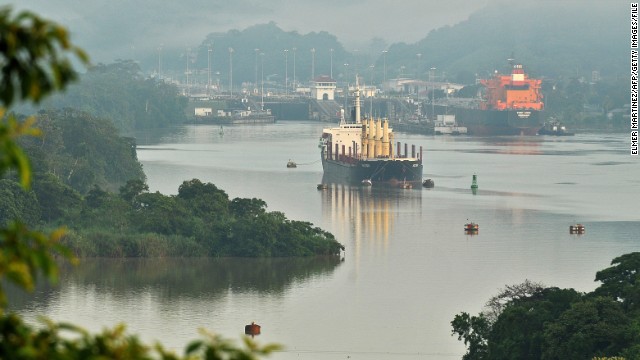 Giant locks -- measuring 1,400-feet-long, 160-foot-wide and 80-foot-deep -- are being installed at either end of the 51-mile aquatic passageway that connects the Atlantic and Pacific Oceans.
Giant locks -- measuring 1,400-feet-long, 160-foot-wide and 80-foot-deep -- are being installed at either end of the 51-mile aquatic passageway that connects the Atlantic and Pacific Oceans. 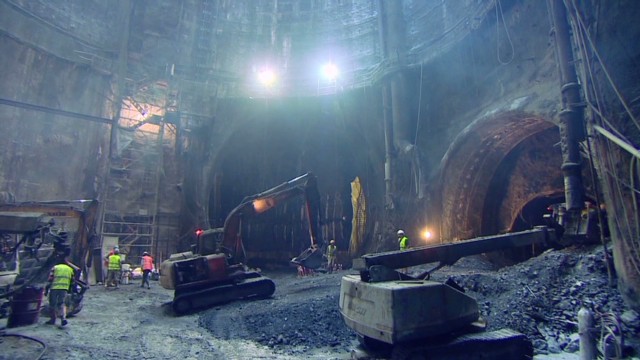 The Marmaray Project is a 76-kilometer (47.2-mile) subterranean development that will connect railway lines on either side of Istanbul's Bosphorus Strait.
The Marmaray Project is a 76-kilometer (47.2-mile) subterranean development that will connect railway lines on either side of Istanbul's Bosphorus Strait. 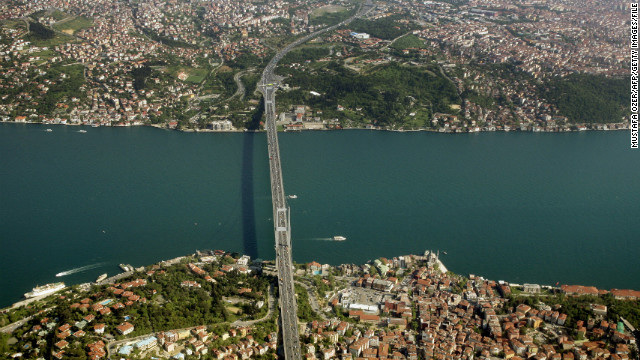 A 0.9-mile section of the tunnel will delve deep beneath the waters of the Bosphorus, which separate continental Asia and Europe, carrying an estimated 150,000 passengers every hour.
A 0.9-mile section of the tunnel will delve deep beneath the waters of the Bosphorus, which separate continental Asia and Europe, carrying an estimated 150,000 passengers every hour. 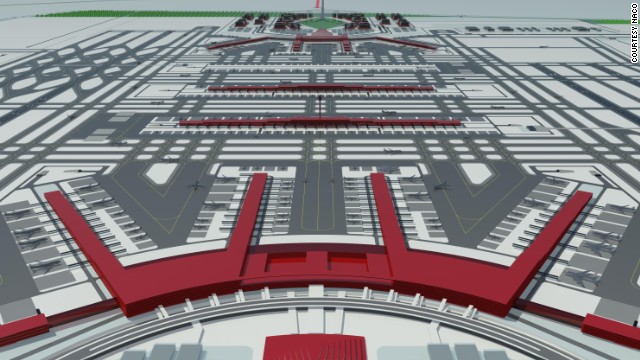 Beijing's new international airport will be among the the busiest and the biggest airports in the world when it comes online in 2017, with the capacity to cater for some 130 million passengers every year.
Beijing's new international airport will be among the the busiest and the biggest airports in the world when it comes online in 2017, with the capacity to cater for some 130 million passengers every year. 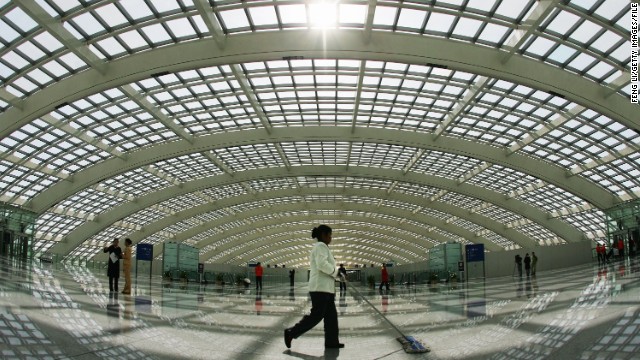 Beijing Capital International (pictured) is currently the busiest airport in China -- servicing 80 million passengers every year -- but will be nearing its operating capacity by the time the new facility is open for business.
Beijing Capital International (pictured) is currently the busiest airport in China -- servicing 80 million passengers every year -- but will be nearing its operating capacity by the time the new facility is open for business. 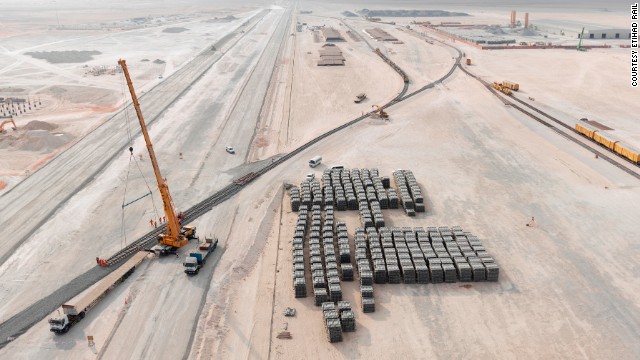 The 1,200 kilometer Etihad Rail network will extend across the desert hinterland of the United Arab Emirates, costing a cool $11 billion and enhancing freight and passenger transport infrastructure across the country.
The 1,200 kilometer Etihad Rail network will extend across the desert hinterland of the United Arab Emirates, costing a cool $11 billion and enhancing freight and passenger transport infrastructure across the country. 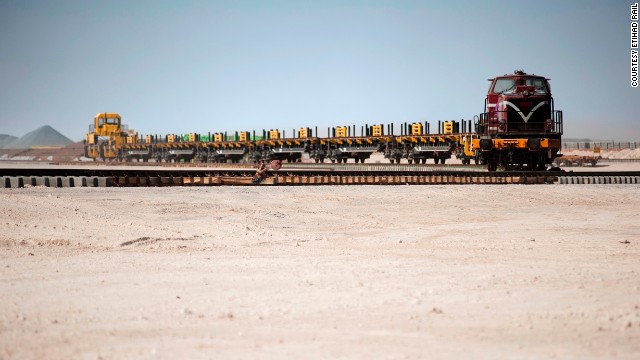 Developers hope the tracks will eventually join up with an international Gulf rail network covering Bahrain, Kuwait, Saudi Arabia, Oman and Qatar.
Developers hope the tracks will eventually join up with an international Gulf rail network covering Bahrain, Kuwait, Saudi Arabia, Oman and Qatar. 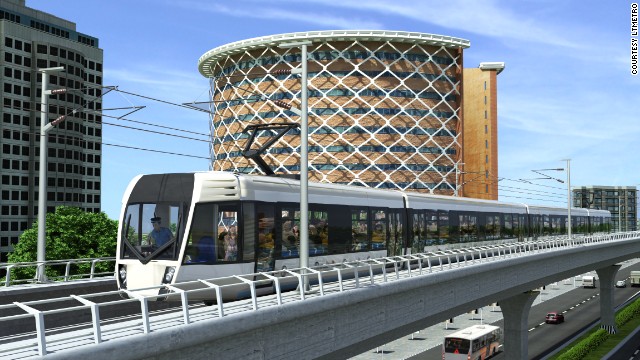 An artist's impression of the new $2.1 billion Hyderabad Metro system which aims to provide a new mode of daily transport for up to 1.7 million of the southern Indian city's residents by 2017.
An artist's impression of the new $2.1 billion Hyderabad Metro system which aims to provide a new mode of daily transport for up to 1.7 million of the southern Indian city's residents by 2017. 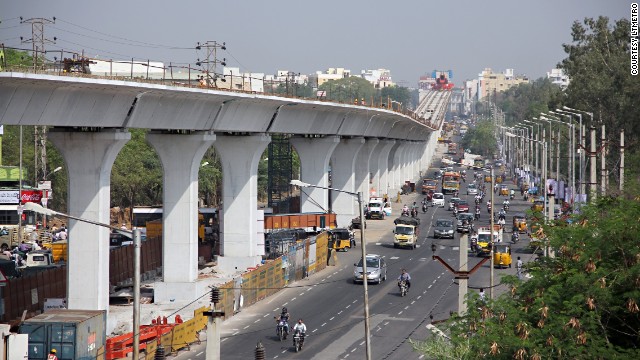 Developers say the 72-kilometer long track will improve journey times and reduce traffic on the city's congested roads.
Developers say the 72-kilometer long track will improve journey times and reduce traffic on the city's congested roads. 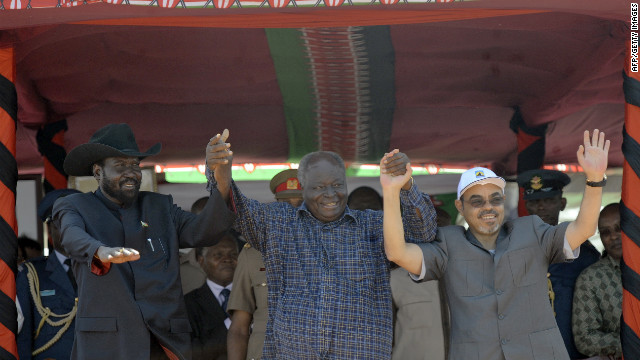 Presidents (left to right) Salva Kiir of South Sudan, (former president) Mwai Kibaki of Kenya and Meles Zenawi of Ethiopia celebrate following the ground breaking ceremony of the Lamu Port--South Sudan--Ethiopia Transport Corridor (LAPSSET) in March 2012.
Presidents (left to right) Salva Kiir of South Sudan, (former president) Mwai Kibaki of Kenya and Meles Zenawi of Ethiopia celebrate following the ground breaking ceremony of the Lamu Port--South Sudan--Ethiopia Transport Corridor (LAPSSET) in March 2012. 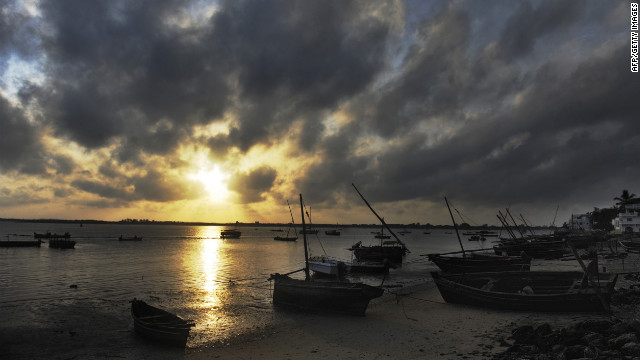 Costs for the project are expected to come in at around $20 billion although concerns remain over the development's impact on the likes of the Lamu Port area (pictured), which is listed as a UNESCO World Heritage site.
Costs for the project are expected to come in at around $20 billion although concerns remain over the development's impact on the likes of the Lamu Port area (pictured), which is listed as a UNESCO World Heritage site. 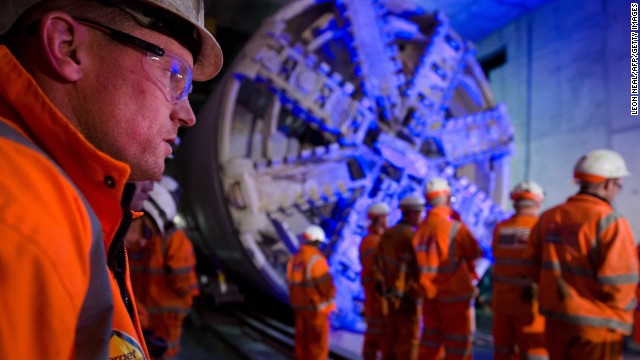 Crossrail construction workers stand near to one of the projects mammoth 1,000-ton tunnel boring machines. The $23 billion development will connect London from east to west, improving access to Heathrow Airport as well as the city's suburban and satellite towns.
Crossrail construction workers stand near to one of the projects mammoth 1,000-ton tunnel boring machines. The $23 billion development will connect London from east to west, improving access to Heathrow Airport as well as the city's suburban and satellite towns. 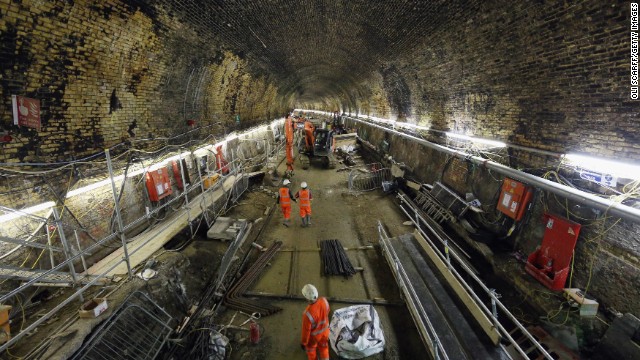 More than 8,000 people are involved in the Crossrail development working across 40 separate construction sites.
More than 8,000 people are involved in the Crossrail development working across 40 separate construction sites. 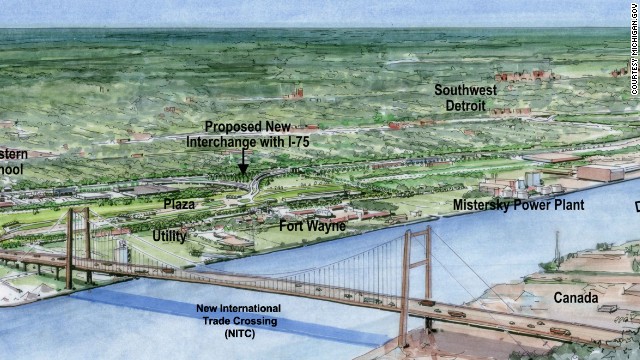 An artists rendering of the New International Trade Crossing between Windsor, Ontario, and Detroit, Michigan. The $950 million project aims to increase opportunities for businesses and entrepreneurs in both Canada and the U.S.
An artists rendering of the New International Trade Crossing between Windsor, Ontario, and Detroit, Michigan. The $950 million project aims to increase opportunities for businesses and entrepreneurs in both Canada and the U.S. 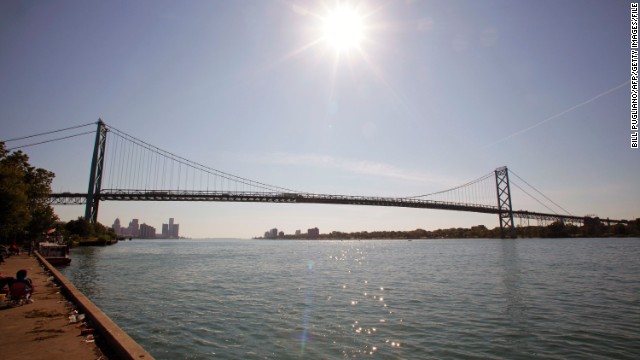 The nearby Ambassador Bridge -- whose owners have logged legal challenges to construction of the NITC -- is responsible for 25% of all trade between Canada and the U.S., according to the bridge operator's website.
The nearby Ambassador Bridge -- whose owners have logged legal challenges to construction of the NITC -- is responsible for 25% of all trade between Canada and the U.S., according to the bridge operator's website. 
1

2

3

4

5

6

7

8

9

10

11

12

13

14

15

16
- The dominant economic chatter may be of austerity but ambitious transport infrastructure projects continue
- In many emerging nations transport spending is speeding ahead while large projects also continue in the developed world
- Massive bridges, airports, metro systems and canal's are currently all in the works
The Gateway goes behind the scenes of the world's major transport hubs, revealing the logistics that keep goods and people moving. This month, the show is in Singapore.
(CNN) -- Austerity, spending cuts and deficit reduction.
With all the talk of fiscal restraint, it's easy to assume there's little in the coffers for the sort of vast infrastructure projects we've seen over the last century.
True, the EU has reduced its transport infrastructure budget through 2020, while groups like the American Society of Engineers have stated that too little is being put aside to fund the big projects of tomorrow -- but it's not all doom and gloom.
In many emerging nations transport spending is speeding ahead at breakneck pace, while in the developed world large projects have continued despite the rumbling aftershocks of the 2008 financial crash.
Here, we take a look at some of the biggest, most important and spectacular transport infrastructure developments currently in the works around the world.
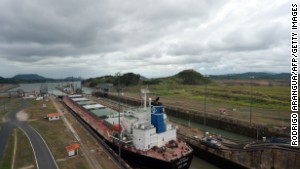
Panama Canal
Already an engineering wonder, the 99-year-old Panama Canal is being upgraded to cater for the ever increasing heft of the world's merchant shipping fleet. Construction was approved in 2006 and is due for completion in 2014.
See also: 7 of the world's most entertaining airports
The $5.25 billion project will add three 1,400-foot-long, 180 foot wide and 60-foot-deep locks to each end of the 51-mile aquatic passageway that links the Pacific and Atlantic oceans. This enhanced capability will enable the canal to cater for more of the giant container vessels that are increasingly favored by the world's largest shipping companies.
A few hundred miles to the north meanwhile, early plans are afoot to build a new canal in Nicaragua with even greater capacity at a cost of $40 billion.
Marmaray Project
A city straddling two continents, Istanbul has long been a strategic gateway between Europe and Asia.
Now, construction of one of the world's deepest submerged transport tunnels is pulling east and west even closer together. The Marmaray Project is a 76-kilometer (47.2-mile) subterranean railway development that will ferry travelers under a 1.4-km (0.9-mile) section of the Bosphorus Strait and connect busy railway lines on either side of the historic waterway.
The project began in 2004 and is due to be completed towards the end of 2013, later than originally planned due to delays caused by the archaeological sensitivity of the surrounding area.
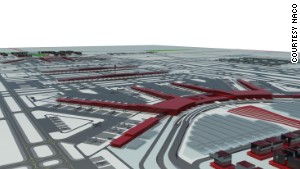
Beijing's new international airport
Playing host to eight runways and with the capabilities to cater for 130 million passengers every year, Beijing's new international airport will be among the world's largest and busiest when it is slated to come online in 2017 (although Istanbul's recently announced third airport will trump it with a 150 million capacity when it opens in 2018).
See also: Could drones replace roads?
Air travel has expanded rapidly in China in recent years in line with the country's booming economy. In 2011, the Chinese government announced plans to increase the total number of airports in the country from 175 to 230 by 2015 to cope with demand.
Beijing alone is set to handle between 450 and 500 million passengers every year by then, meaning the city's existing airports need assistance to cope with the expected rise in demand. Construction of the new airport, which will be situated in the city's Daxing district, was confirmed in January 2013 and is due to begin in early 2014, according to local media.
Etihad Rail Network
In a land brimming with ostentatious development projects, the nitty-gritty of rail infrastructure pales when compared to the world's tallest building or man-made luxury islands -- but it shouldn't.
The 1,200 kilometer Etihad Rail network will extend across the desert hinterland of the United Arab Emirates, from the border of Saudi Arabia in the west to the frontiers of Oman in the east.
Costing $11 billion and taking in Dubai, Abu Dhabi and all of the Northern Emirates, developers hope the freight and passenger project will eventually join up with an international rail network covering Bahrain, Kuwait, Saudi Arabia, Oman and Qatar.
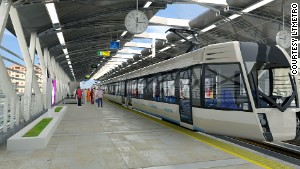
Hyderabad Metro
Towering high above chaotic din of inner-city traffic, the Hyderabad Metro system is expected to provide daily transport for up to 1.7 million of the southern Indian city's residents by 2017, according to the regional government.
The $2.1 billion project will provide 72 kilometers of elevated track with stations every one kilometer. Developers say the system will improve journey times, reduce traffic on roads and provide an eco-friendly mass transport alternative to polluting car or bus journeys.
The LAPSSET Project
In 2012 the presidents of Kenya, Ethiopia and South Sudan came together to launch the ambitious LAPSSET (Lamu Port--South Sudan--Ethiopia Transport Corridor) project.
The plans include an oil refinery, pipelines from South Sudan, transportation hubs for rail, road and air vehicles, plus a giant port for oil tankers. A number of tourist resort cities are also expected along the development's path.
See also: The tiny nation with a big economic punch
Costs are set to come in at around $25 billion although concerns remain over the impact on the local environment. Lamu Port is listed as a UNESCO World Heritage site and the surrounding area is home to protected marine reserves and forests.
The Kenyan government has set aside $23 million for the Lamu section of the project while Reuters reported that a Chinese company had won the first tender to build three berths at the port in April this year.
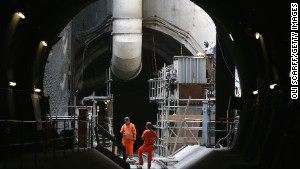
London Crossrail
What the Hyderabad Metro does 20 meters above ground, London's Crossrail project will seek to do beneath the British capital's bustling streets and out into its sprawling suburbs.
A $23 billion development, the 73-mile rail project will connect London from East to West, improving access to Heathrow Airport, central London as well as city's surrounding towns and suburbs.
Work began in 2009 and the first trains could be in operation as early as 2018. More than 8,000 people are involved in the project working across 40 separate construction sites.
NITC Bridge
Although not the most expensive infrastructure project in the pipeline, the $950 million New International Trade Crossing bridge -- which will connect Windsor, Ontario in Canada and Detroit, Michigan in the U.S. -- could well be one of the most impactful as far as international trade is concerned.
The NITC's stated aims are to increase commerce capacity, reduce traffic bottlenecks and improve opportunities for businesses in both countries by providing a state-of-the-art, publicly operated border crossing.
See also: Is Danube Romania's 'blue motorway?'
Roughly 25% of all merchandise trade between Canada and the United States -- one of the world's largest bi-lateral trade partnerships -- currently cross over the Detroit River via the nearby (privately run) Ambassador Bridge, according to the bridge operator's website.
Barack Obama ordered a presidential decree to construct the NITC in March this year, however the owners of the Ambassador Bridge have logged legal challenges against the project.
They have also announced plans to expand the existing capacity of their own facility which originally opened in 1929.
What exciting projects did we miss on our list? Let us know in the comments section below.







